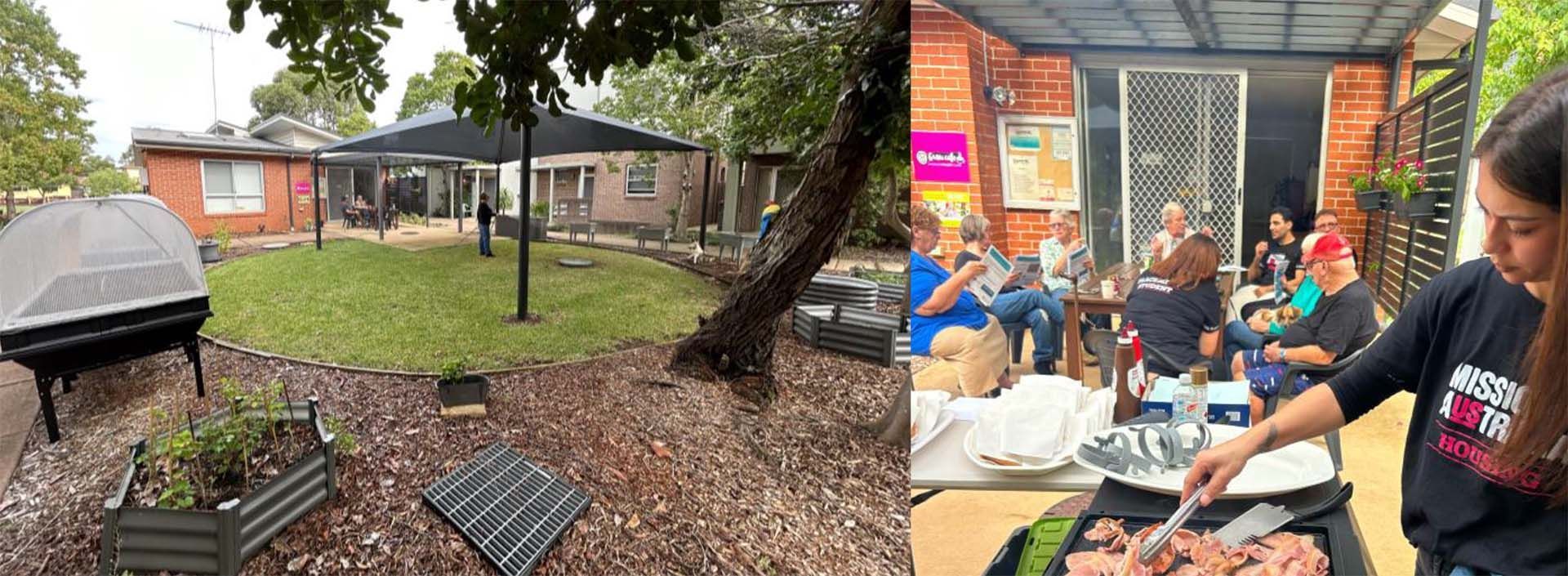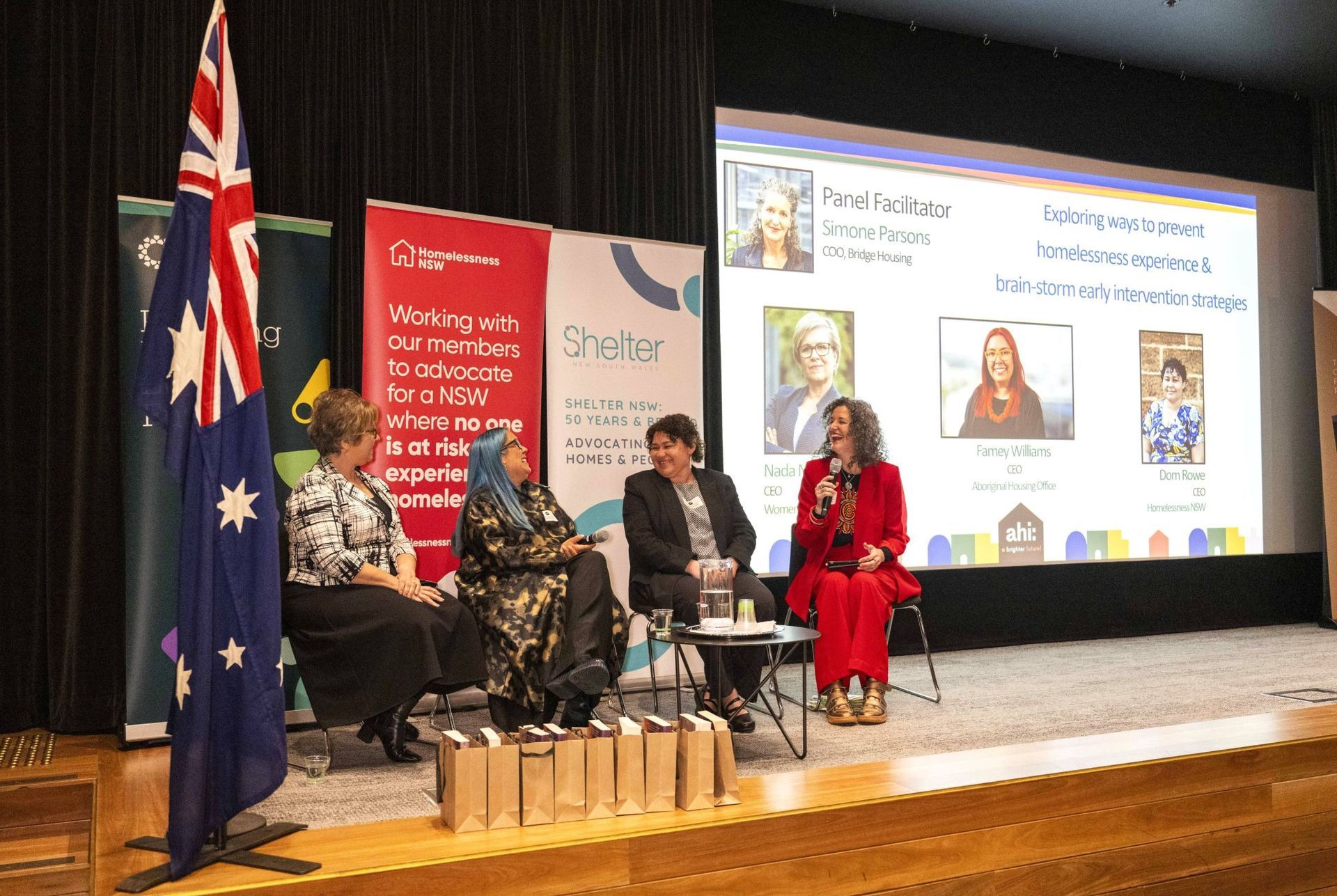Sometimes, the simple things in life can make a world of difference, as HousingWORKS discovered about Mission Australia Housing’s Kingswood Seniors Complex and Guru Café, finalists in the Tenant Led Initiative category of the NSW ahi: Brighter Future Awards 2023.
Located in the greater western Sydney area, the Kingswood Seniors Complex is a Mission Australia Housing (MAH) community. Mostly seniors housing, it’s home to 65 residents, and is also a short walk to other MAH residential properties for seniors, as well as tenants residing in transitional housing.
With isolation having a major adverse impact on the health and wellbeing of Kingswood’s residents during the pandemic lockdowns in 2020, a group of tenants worked with MAH to create a safe local space that would allow everyone to come together and maintain important community and social connections.
In partnership with MAH Community Development Manager Kudzi Maforimbo, an existing community centre and green common area was identified as the site for what would become the Guru Café and Community Garden. This mainly consisted of a coffee shop with covered awning but also — with expert guidance from staff at Sydney’s Royal Botanic Gardens, whose visits are always eagerly awaited by tenants at Kingswood — a green space with vibrant herb and vegetable gardens.
The café opened its doors to the resident community in 2022.
"The name Guru, which means ‘high waters’ in local Darug language, was unveiled through an opening and community celebration.”
As Kudzi Maforimbo explains, it was important to the residents of Kingswood and the centre’s volunteers to acknowledge the region’s traditional custodians of the land, and their culture: “Accordingly, after consultation with local Aboriginal organisations and a voting process, the name Guru, which means ‘high waters’ in local Darug language, was unveiled through an opening and community celebration.”
According to Hildagard (Hilda) Reinish, a resident at Kingswood and one of the driving forces behind the establishment and ongoing running of Guru café, “There used to be a community centre open before COVID, but it was basically not really run properly. It had some cheap kettles and people didn’t really want to come.”
“When Kudzi [Maforimbo] took over as coordinator for the community centres, he said, ‘Well, we should do something, but we don’t have the finances to do it’,” Hilda continues. “So, he suggested I put together a list of what we would like to have. We forwarded the letter to a government department – and we got a grant! Then we were able to put up shade cloth outside, and a roof over our superstructure, so we could sit outside.”
“We got a proper coffee machine,” she laughs, “a new fridge and what-have-you. And we made it a coffee shop that opens twice a week.”
Hilda’s reason for laughing when referring to a “proper coffee machine” soon became evident as she talks further about the type of coffee served. As well as working hard to provide Kingswood tenants with somewhere safe to gather and get to know one another, she’s also arguably the complex’s resident coffee connoisseur.
“A cup of coffee has to be decent, otherwise, I just don’t need it."

“It’s definitely not instant coffee [being served] because I do not drink instant,” she states bluntly. “A cup of coffee has to be decent, otherwise, I just don’t need it. If it’s not a nice cup of coffee, I won’t have it. Full stop.”
“At home, I have my own machine, which makes a beautiful coffee. In the morning, I have a small one, a standard size short black. If I have two in a day, I have a double. Put it this way, I don’t have a ‘nana nap’ during the day!”
While admitting she’d like to see more residents coming in regularly and saying hello, Hilda is adamant the positive influence the café and community garden have on people’s wellbeing and social connectedness is pronounced and clear.
“Some people are lonely and they come there just to have a chat,” she observes. “There are a lot of people living on their own. I definitely see the café as a positive, because people do comment when they come in. Before they go home, they say, ‘Thank you for the company, and for the nice chat’. They really love that interaction.”
“We always have the same people turning up, but they love it because we can sit together, we can chat and gossip,” she laughs. “There’s a gentleman who helps out here who’s just recovered from cancer. Whatever has to be done, like coordinating supplies, taking care of the cleaning up and so on, we do it. And, we even have couples who turn up; a married couple who always turn up every Tuesday and every Friday no matter what.”
“We all sit here for at least two hours. It’s not just a coffee and goodbye. We sit and we talk for a while."
“We all sit here for at least two hours. It’s not just a coffee and goodbye. We sit and we talk for a while. They love it, and I enjoy it too, you know.”
As well as a good cup of coffee – for the bargain price of just two dollars! – another drawcard of the Guru café for residents is the selection of homemade cakes and snacks baked by Hilda and other volunteers.
“I make a lot of cakes for the coffee shop, and there’s another lady we’ve got there, she makes some cakes. If there are leftovers, there are always a few people happy to take them home.”
Similar to her perfection with coffee, a good cake is something Hilda refuses to compromise on: “See, I’m Austrian, and I also make Black Forest Cake, and that’s the one they all look forward to, naturally. I don’t do it all the time, but I do it sometimes, depending on what kind of mood I’m in because I do it the proper way, how it should be done,” she laughs.
“Most places don’t do Black Forest cakes with fresh cream; they do them with mock cream and I hate that,” she goes on to detail. “And they don’t put the proper sour cherries in, and they don’t use kirsch [kirschwasser — a dry, clear brandy distilled from black morello cherry juice and pits – not to be confused with creme de kirsch, a sweet cherry liqueur], which you have to put into the cake itself. You also have to cook the cherries in it as well, before you put the cherries in the cake, so you can taste a little bit of alcohol. It just makes the cake taste better; that’s how it should be.”
As for the future of the initiative, Kudzi hopes the program will be expanded to other MHA sites, saying the Kingswood Seniors Complex and Guru Café “has inspired other complexes who are now interested in creating similar models”.
“With the support of the Kingswood tenants as mentors, we’re already planning to develop another community café in western Sydney by the end of 2024, based on the success of Guru café and garden,” he says. “It is the tenants who are the true champions at the Kingswood complex… Guru [has] truly gone from strength to strength.”
Hilda was grateful for the support from Kudzi, saying that a lot of its success was due to his tenacity to see it through to fruition: “You could talk to him and get things organised. Sometimes, it took him a bit longer than we expected because he had a lot on his plate – it was as simple as that. He was so good.”
“Kingswood’s got problems,” Hilda concludes in a philosophical tone, “Kingswood is a bit of a problem area in a lot of respects, but this [café and garden] makes people happy.”
HILDA'S BLACK FOREST CAKE RECIPE
Cake ingredients:
100gms of unsalted butter
50gms of dark chocolate
6 eggs
130gms of sugar
100gms of self-raising flour
60gms of cornflour
1 packet of baking powder
3 soupspoons of cocoa
6 soupspoons of kirsch (aka. kirschwasser)
Filling ingredients:
400gms of sour cherries
200mls of sour cherry syrup
2 teaspoons of cornflour
3 soupspoons of sugar
800mls of pure cream
2 packets of vanilla sugar
Method for cake:
Preheat oven to 180 degrees centigrade. Melt chocolate and butter over steam. Once soft, mix in sugar flour, self-raising flour and cornflour.
Separate eggs. Mix yolks with baking powder and cocoa. Beat the egg white mixture until very stiff and then fold into the egg yolk mixture.
Pour into 26cm springform cake tin and bake for 40 minutes. When finished, place on cooling rack until cool to touch.
Method for filling:
Put three soupspoons of cherry syrup in a little bowl. Mix in cornflour. Put the rest of the syrup in saucepan on stovetop and bring to the boil. Add sugar, bring to the boil again and then remove from heat.
Stir cherries through the mixture. Place in a glass bowl, cover with cling wrap and place in the fridge. Make sure it is thoroughly chilled.
For a little extra taste, you can add 2 teaspoons of kirsch to the filling mixture.
Method for presentation:
Once the cake is cold, cut into three layers and put the bottom on a serving plate. All three layers should be sprinkled with kirsch.
Whip the cream mixed with vanilla sugar until very stiff, then fill piping bag with cream and make circles on the edges of the cake about 3cm distance in from each other. Make one more circle with a little cream in the centre. Fill the spaces between the cream circles with cherries from the fridge. Place second layer in position and repeat.
Add the last layer and cover it with cream on both top and sides. Add some cherries on top for decoration and grate some chocolate to finish.
Share This Article
Other articles you may like








